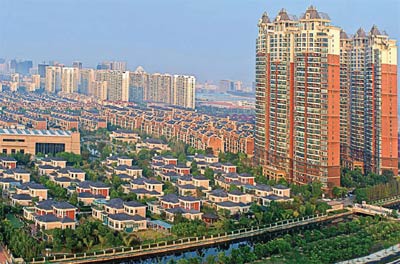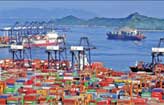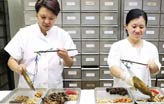City's dynamic teutons
Updated: 2011-08-26 11:55
By Shi Jing (China Daily)
German cluster gives a fillip, competitive edge to local economy in Taicang

In the olden days Taicang, a coastal city in Jiangsu province, was renowned as the port from which admiral Zheng He set out on the first of his seven maritime expeditions. But in recent times the city has become known for its German industrial cluster that has helped bolster China's manufacturing prowess. Thanks to the industrial cluster, Taicang is now one of the most prosperous cities in the Yangtze River Delta region comprising Shanghai municipality and the provinces of Zhejiang and Jiangsu. But what makes Taicang stand tall among other industrial peers is its ordered and disciplined growth that mirrors the fabled Teutonic precision.
The German industrial cluster in Taicang has its genesis in the workshop begun in 1993 by Kern-Liebers, a German precision products maker. Since then some 150 German-owned companies have pitched camp in this sylvan and peaceful town.
Apart from its small harbor, Taicang's main advantage lies in its proximity to cosmopolitan Shanghai, just half an hour's drive away.
Hans-Jochem Steim, board director of Kern-Liebers Group, says that based on its experience of building plants outside Germany, it often looks for a place that can be directly connected to ports like Hong Kong, Singapore and Frankfurt.
"Since Shanghai was too big for us, we decided to look at the neighboring Jiangsu province. Looking at Taicang's proximity to Shanghai, we decided it was the most appropriate place for our factories among all cities in Jiangsu," says Steim.
At the same time, the local government in Taicang has also lent a helping hand in building up the German cluster. Large tracts of farmland were released for setting up the sprawling industrial complex in the city's south. The neighboring rural areas proved to be the ideal hunting ground for migrant workers, many of whom were willing to work for hourly wages of about 20 yuan (2.4 euros), compared to 15 euros in Germany.
Sun Jinquan, director of the Taicang Economic Development Zone Administration says that Kern-Liebers had thought of several other locations like Nanjing, before zeroing in on Taicang.
"Family businesses like Kern-Liebers cannot grow without proper markets. For them, China is now the biggest and most promising market in the world," Sun says.
Set up with an initial investment of about 2.23 million euros, the company, which mainly produces springs and precision products here, now covers a total area of 20,000 sq m. Kern-Liebers' Taicang factory, employing about 400 workers, had a turnover of 200 million yuan last year.
Most of the other German enterprises in the city have similar success tales to tell.
Mubea Automotive Components (Taicang) Co Ltd first came to Taicang in 2005 and had just six German and 40 Chinese employees.
"Our growth has been phenomenal in the last few years. Between 2005 and 2010, our sales has grown by nearly 600 percent," says Friedrich Lamers, plant manager of Mubea Automotive Components (Taicang) Co Ltd.
BOS Automotive Systems (Taicang) Co Ltd, which is most famous for its sun protection systems, reported a turnover of 75 million euros last year, accounting for a seventh of its global sales of about 450 million euros.
"Going by the sales performance last year and the indicators for this year, the Asian market is now the most important global market for us," says Michael Bethke, the Asia-Pacific president of BOS.
In 2010, the total industrial output value of the Taicang Sino-Germany Business Cooperation Base reached 54.1 billion yuan while the overall fiscal revenue reached 5.01 billion yuan. Newly registered foreign capital in the region reached $540 million (376 million euros), and the foreign investment in actual use amounted to $360 million, up about 17 percent and 16 percent year-on-year respectively.
While the German enterprises have recorded handsome growth, they have also played a considerable role in boosting the local economy.
According to local government data, registered foreign investment reached $1.53 billion in 2010, while the actual paid-in foreign investment was $810 million, up 8.1 percent and 8.2 percent year-on-year respectively. Among them, the investment of 69 newly approved foreign-funded projects exceeded $10 million.
"The Chinese market is certainly robust. There is no paucity of funds," says Da Wenmin, director of the Economic Development Bureau in the Taicang Economy Development Area.
"In 2009, the global market performed poorly due to the economic recession. Although German companies did not meet their expected growth targets that year, their sales did not slump. This was a phenomenon that was not witnessed in any other market," Da says.
"Chinese companies used to cling to cheap things in the past. But as we grow richer, the tastes will change and people will look for more expensive goods that come with the quality hallmark. It is also one of the reasons why German products are becoming more popular among Chinese consumers," she says.
"China's growth rate is something that the world should learn from, but the remarkable quality of German products is something that Chinese manufacturers should learn from and imbibe themselves."
The local government is also taking proactive steps to attract more German enterprises to the city. It has decided to give priority in land allotments to German enterprises along with other advantages like labor and power.
City authorities have also ensured that the industrial cluster offers the best working and living environment for German workers and have planned the city after studying similar clusters in Germany. Residential communities along the Xinliu River in Taicang are the most popular among Germans as its surroundings often remind them of the Black Forest in Germany.
"It can be said that most of the factories are sitting in a garden. The building and maintenance of the landscaping in the Economic Development Zone are all done by the local government whereas in places like Shanghai the companies have to pay for it," Da says.
"We have done this to attract the German companies because they bring advanced technology as well as job opportunities to the city," she says.
Taicang's neighboring cities such as Kunshan and Wujiang have also made waves by sporting industrial clusters of companies from Taiwan and South Korea. But even these cities are now sparing no efforts to woo European investors.
"German companies are different from the others. They do thorough research before they come to Taicang. Once they are based here, they will work for long-term growth rather than short-term gains," Da says.
Yet another major learning curve for the town planners has been the fast adoption of green technologies by German companies.
"Polluting companies like printing and dyeing mills as well as electroplating factories are not permitted in our economic zone. Companies of this kind that already exist in the zone are being moved out of the area gradually," Da says.
Much of the green strides are also part of the city's plan to cash in on the new boom in the biotech sector.
But with the central government tightening the laws on land use, Taicang is now looking to boost industrial growth by eyeing the emerging building construction and management economy.
"Some German companies have expressed their interest in undertaking service business in the apartment buildings, which coincides with our future plans," says Da.
Many German workers were unhappy if they had to come to work in Taicang during the 1990s in spite of the hefty pay sweeteners. However, that has changed now and more Germans are keen to come and work here, say city officials.
"Life here is more colorful than in Germany," Da says.
E-paper

Blue economy gets a lift
Coastal areas of Shandong, Zhejiang and Guangdong to spearhead sector development.
Short and sweet
Game for growth
Character reference
Specials

Flying the TCM flag
A small German town is home to Europe's flagship clinic for traditional Chinese medicine

Hunting grounds
Opinion divided as China debates opening door to international players

Star journalist remembered
Friends, colleagues attended a memorial service to pay tribute to veteran reporter Li Xing in US.
